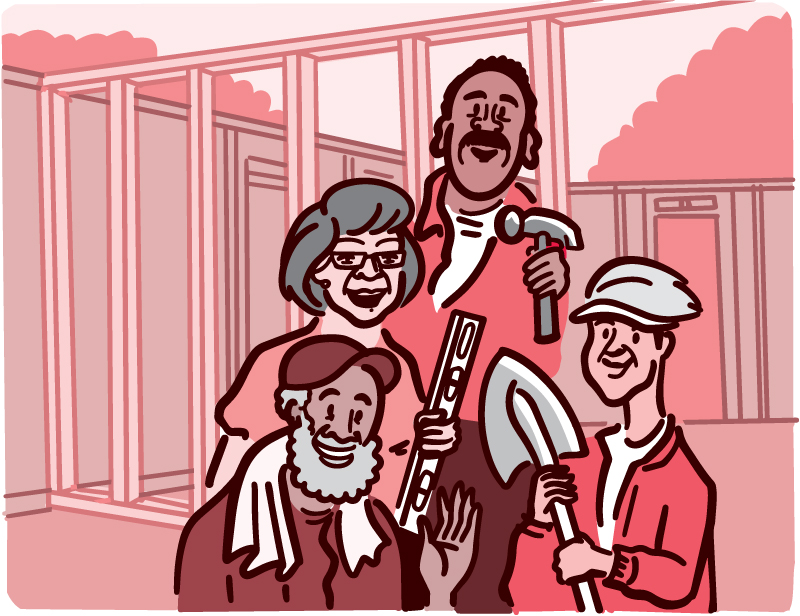A Well-Aged Mind
Maintaining Your Cognitive Health

Getting older can bring many changes, both physically and mentally. Even when you’re healthy, your brain and body start slowing down. Maintaining your cognitive health—the ability to clearly think, learn, and remember—is important for your overall well-being.
Many things influence cognitive health. Your genes, lifestyle, and environment can all impact your thinking skills and ability to perform everyday tasks.
“I like to think about the brain as a computer disk for memory and thinking,” explains Dr. Marie Bernard, an aging expert at NIH. “As you get older it gets fuller and fuller. So, it can get more difficult to retrieve data and add data to it. But you’re still able to learn and grow.”
Aging is bound to bring changes. But there are many things you can do to protect your cognitive health as you age. That includes knowing what puts your well-being at risk.
Staying Aware
“Older adults are often targeted by scam artists,” says Dr. Patricia Boyle, who studies the aging brain at Rush University.
Older adults are also more likely than younger ones to pick up the phone without knowing who’s calling, she explains. “Simply by doing that, you’re opening yourself up to a conversation with someone who may be an unscrupulous person trying to steal from you.”
Common scams targeting older adults include identity theft, risky or fake investments, charity scams, and people posing as relatives in distress to ask for money.
Any adult can fall victim to these sorts of scams. But Boyle and her team recently found that low awareness of tactics used by scam artists may be an early indicator of worsening brain function.
In their study, people with low scam awareness were about twice as likely to later develop Alzheimer’s disease as those with high scam awareness.
People should verify any investment proposal or request for money before acting, Boyle explains. Trusted family members or friends may be able to help with this. “Take the time to look into financial propositions and make sure they are legitimate,” she says.
Reversing Changes
If you experience a sudden change in thinking, memory, or mood, it may be caused by a new medication. Some drugs may not cause cognitive changes when taken on their own but can do so when combined with other medications. Even common supplements or over-the-counter remedies can cause these types of interactions.
Sometimes, if you have more than one doctor, one might not know what the others prescribed. “Older adults really benefit from having a list of all their over-the-counter, herbal, and prescribed medications with them whenever they see a health care professional,” says Bernard.
Certain medications can also have dangerous, or even deadly, effects when combined with alcohol. And alcohol alone poses risks for the older brain. It can take less alcohol to alter judgment, coordination, balance, or sleep patterns in an older adult.
Dangerous drinking habits have been rising among older adults in the U.S. A recent NIH-funded study found that 1 in 10 Americans aged 65 or older binge drinks regularly. That means drinking four or more drinks on the same occasion for women and five or more for men.
Older adults may change their drinking habits to cope with the death of a partner or other loved one, or because they’re lonely. But drinking can also be part of social activities for older adults, explains Dr. Edith Sullivan, an alcohol researcher at Stanford University.
“Older adults might feel that ‘well, I’m old now, it’s OK for me to drink,” Sullivan says. But older brains and bodies are especially vulnerable to the effects of alcohol, she adds.
A recent study by Sullivan and her team used brain imaging to see how alcohol affects the brain. They found that older adults who misused alcohol had greater loss of brain tissue compared with their peers who didn’t drink. This was true even if they started misusing alcohol later in life.
The good news, she explains, is that some problems with thinking or memory caused by medications or alcohol misuse can be reversed. “That’s different from classical dementia, which is a one-way street of decline,” says Sullivan.
Building Brain Power
Managing your health conditions is also important. Controlling your blood pressure, for example, reduces the risk of having a small stroke (bleeding from blood vessels in the brain). Small strokes can cause temporary or permanent cognitive problems.
Feeling a sense of purpose in one’s life also seems to help protect older adults from cognitive decline. A study from Boyle and her colleagues found that people who felt more purpose in life had fewer symptoms from brain changes linked to Alzheimer’s disease.
“The aging brain can accumulate Alzheimer’s changes, but if you’re stimulating your brain and strengthening it like a muscle, you may be better able to tolerate those changes,” she says.
Bernard stresses that getting older can also bring cognitive advantages you might not know about.
“Older adults have greater verbal ability than younger adults. They’re better problem solvers. And accumulated experiences are very helpful,” she says.
“Think about the positive things that come with aging,” Bernard says. “It’s a great time to become engaged in meaningful activities, maintain connections to friends and family, develop new connections, and be physically active. And in turn, all of these things can enhance one’s quality of life and one’s aging.”
NIH Office of Communications and Public Liaison
Health and Science Publications Branch
Building 31, Room 5B52
Bethesda, MD 20892-2094
Contact Us:
nihnewsinhealth@od.nih.gov
Phone: 301-451-8224
Share Our Materials: Reprint our articles and illustrations in your own publication. Our material is not copyrighted. Please acknowledge NIH News in Health as the source and send us a copy.
For more consumer health news and information, visit health.nih.gov.
For wellness toolkits, visit www.nih.gov/wellnesstoolkits.




